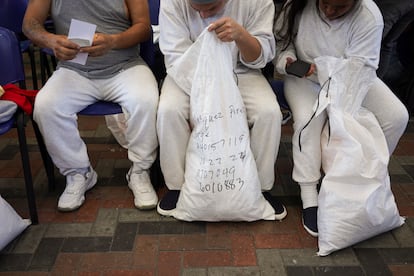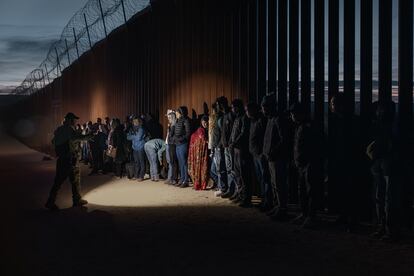Deportation as a banner: The assault on immigration in Trump’s second term
The president will begin implementing his immigration plans immediately, with the first raids set to take place this week


The countdown is over: arrests and deportations of immigrants in the new Trump era will begin this week.
Trump has been warning about this since he secured his return to the White House back in November. And he repeated it again in his last rally as president-elect, held this past Sunday in the nation’s capital. “By the time the sun sets tomorrow evening, the invasion of our borders will have come to a halt and all the illegal border trespassers will, in some form or another, be on their way back home,” said the Republican, just 18 hours before being sworn in as the 47th president of the United States.
The new government will begin arresting undocumented immigrants after the inauguration on Monday. The raids will begin in Chicago, Illinois, on Tuesday. They will subsequently spread throughout the country, while the administration prepares to carry out the “largest deportation program in American history” that the Republican promised during his campaign. The first arrests will focus on immigrants with criminal records, but Trump has assured his supporters that his plan is intended to deport all undocumented immigrants in the country. The number is estimated at around 11 million — according to official figures — but the tycoon has even spoken of as many as 25 million.
All eyes are on the first executive orders that the Republican president will sign after his inauguration ceremony. In line with what he’s promised, it’s expected that — after taking office — Trump will declare a “national emergency” almost immediately along the southern border of the country. This declaration will allow him to militarize the border area and seal off entry points into the country. Additionally, with this tool, he’ll have an arsenal of military funds at his disposal, as well as resources to implement his plan for mass detentions and deportations.
The fact that the Republican intends to use the declaration of a “national emergency” in this way has already sparked criticism, since U.S. law prohibits soldiers from directly detaining members of the civilian population. However, Trump has made it clear that he’s willing to push the law to the limit, so that he can get what he wants. In his first term, he similarly used emergency authority to access military funds to build sections of his border wall with Mexico, after Congress denied him funding for it.
But the Congress of that time — which at least tried to curb his most radical immigration policies — is very different today. Trump returns to the White House with a Republican majority in both legislative chambers. And he’ll have this governing majority until at least 2026, when the midterm elections are held. Alongside a friendly judiciary, with numerous judges appointed by him — including three of the six justices of the conservative majority on the Supreme Court — the possibility of an opposition similar to that which he faced in his first presidency has practically been eliminated.

A pro-Trump Congress
The new legislature — which began its mandate in early-January — already started aligning itself with Trump’s immigration program even before he took office. The incoming White House deputy chief of staff — Stephen Miller — made sure of this, making multiple visits to the Capitol in recent weeks. Miller is in charge of overseeing the immigration policies of the new government, and will work alongside another anti-immigration hawk and faithful advisor to Trump: Tom Homan. After being at the head of the Immigration and Customs Enforcement (ICE) during the Republican’s first term, Homan now returns as border czar, in charge of planning actions such as the raids that will begin this Tuesday.
In the days leading up to the inauguration, Miller held meetings with Republican Party leaders in Congress, in which he conveyed to legislators the urgency of moving forward and facilitating Trump’s immigration policies. His message was a hit: everything points to Trump signing the first immigration law of his second term in his first days in office. It’s a bill that’s already advancing through the Senate, which is set to approve it on Monday. The legislation allows for the deportation of undocumented immigrants who have committed minor crimes (such as shoplifting), even if they haven’t been convicted. The House of Representatives has already voted in favor of the law and will do so again when it returns to the lower chamber for final approval. It will then reach Trump’s desk to be signed into law.
The law is named after Laken Riley, a 22-year-old nursing student who was murdered last February on the campus of the University of Georgia. Her killer — Venezuelan citizen José Antonio Ibarra, who received a life sentence for the crime — illegally crossed the border in September 2022. Before the murder, he was arrested for a robbery, but he was allowed to remain free while processing his legal status. It was one of the cases Trump used during the election campaign to advance his theory that migrants who are in the country illegally are all criminals, even though nearly 90% of them have no criminal record.
The law — which passed in both legislative chambers with key support from some Democratic lawmakers — requires ICE to detain undocumented immigrants who are accused or convicted of nonviolent theft, robbery, or assault. Officers must then hold them in its custody until they are removed from the country. Under current law, a person must have been convicted of two misdemeanors or one felony to face deportation.
Allies
Trump not only holds absolute power in the three branches of the federal government: he also has the support of several Republican governors, who will be key to carrying out his immigration project. Such is the case with Texas, whose governor has offered to host detention centers along the border, which will function as launching pads for the magnate’s deportations. Or Florida, whose governor — Ron DeSantis — has emphasized that his administration will collaborate closely with the new federal government on immigration matters.

“With President Trump taking office, Florida has a unique opportunity to help facilitate the end to America’s immigration crisis,” said DeSantis, a former candidate for the Republican presidential nomination, last week. The governor has called a special legislative session on immigration, with the aim of positioning Florida to assist the incoming administration. Among the measures he has proposed is giving local and state security forces the power to arrest and detain undocumented immigrants, while making illegal entry into the United States a crime under Florida law. Currently, illegal entry into the country is only a federal crime.
But Trump doesn’t only have influence in Republican-led regions: some Democrats have also closed ranks behind him. New York City Mayor Eric Adams — the city that has received the most migrants during the massive wave of migration in recent years — has assured the media that he will work with the new administration in its deportation campaign. In fact, the Democratic mayor met with Trump three days before his inauguration. In this case, however, immigration policy is not the only thing that has forged this alliance: Trump has stated that he’s considering the possibility of pardoning Adams. In September 2024, the mayor was indicted on bribery and campaign finance offenses. He faces a difficult re-election campaign in the coming months.
At the same time, some Democratic states — including California, Illinois and Colorado — will continue to be bastions of resistance to Trump’s plans. So will the so-called “sanctuary cities” — cities that, according to local regulations, don’t collaborate on immigration matters with the federal government. But whether they’ll succeed remains to be seen. New York City is currently one of these sanctuaries, although this may change soon.
Sign up for our weekly newsletter to get more English-language news coverage from EL PAÍS USA Edition
Tu suscripción se está usando en otro dispositivo
¿Quieres añadir otro usuario a tu suscripción?
Si continúas leyendo en este dispositivo, no se podrá leer en el otro.
FlechaTu suscripción se está usando en otro dispositivo y solo puedes acceder a EL PAÍS desde un dispositivo a la vez.
Si quieres compartir tu cuenta, cambia tu suscripción a la modalidad Premium, así podrás añadir otro usuario. Cada uno accederá con su propia cuenta de email, lo que os permitirá personalizar vuestra experiencia en EL PAÍS.
¿Tienes una suscripción de empresa? Accede aquí para contratar más cuentas.
En el caso de no saber quién está usando tu cuenta, te recomendamos cambiar tu contraseña aquí.
Si decides continuar compartiendo tu cuenta, este mensaje se mostrará en tu dispositivo y en el de la otra persona que está usando tu cuenta de forma indefinida, afectando a tu experiencia de lectura. Puedes consultar aquí los términos y condiciones de la suscripción digital.








































